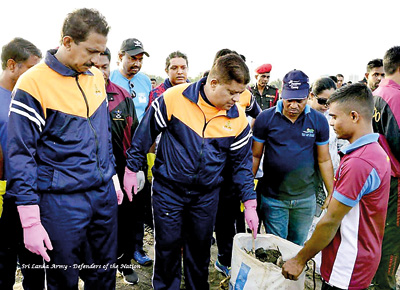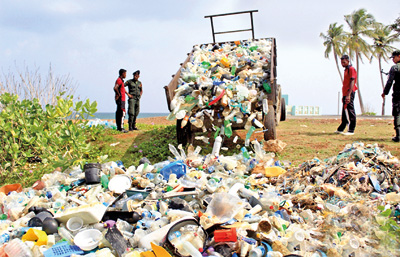News
Into combat against bottles and bags – new wars for new times
In one of the biggest beach clean-ups, hundreds of soldiers led by Army Commmander Lieutenant-General Shavendra Silva collected loads of plastic waste littering the coastline this week – but the waste keeps coming.

Army Commmander Shavendra Silva at the clean-up at Crow Island
With a new government in place and police environmental units activated, action against polluters is gathering force.
“We are planning to take legal action against those who break the law in dumping garbage,” Deputy Inspector-General of Police Muditha Pussella in charge of the Environmental Police Unit told the Sunday Times.
At Crow Island off Mattakkuliya, Lt-Gen. Silva and his troops collected huge amounts of bottles, polythene and plastic rubbish, helped by members of the public.
The beach was heavily polluted partly due to plastic bottles and other waste cast into the Kelani river that flows through to the estuary there and settles along the coastline. In addition, rubbish discarded from ships entering Colombo Port settles on the beach.
The beach area, close to a popular walking path used by hundreds, has been an eyesore for months.
The navy has also been conducting a large number of programmes to protect the marine ecosystem and clean the coastal belt around the country. Navy cleanup programmes took place recently at Wellawatte in Colombo, and Trincomalee.
Lieutenant-Commander Isuru Suriyabandara said the cleaned beaches were now free of pollutants and would continue to be kept in good condition by the navy.
The navy has appealed for public help with other projects such as turtle conservation and coral implantation.

Dehiwala-Mount Lavinia beach cleanup. Pix by Reka Tharangani
Sri Lanka’s coastal belt is 1700km long and 103 rivers flow into the sea around the island, said Gamini Hewage, a senior official at the Department of Coast Conservation and Coastal Resources, pointing to the size of the task in protecting beaches from pollution.
Around 1.59 million tons of garbage were released into the ocean annually around the country.
Mr. Hewage, Director of Coast Resource Management, revealed there had been a slight reduction in certain areas of rubbish being thrown on beaches, with people being aware of the new government’s crackdown on pollution.
“We will get the assistance of the environmental police to proceed with our work,” he emphasised.
Cleanup work started in Dehiwela, Wellawatte and Mount Lavinia, “these being the busiest beaches due to their proximity to Colombo,” he said.
The department plans to recruit personnel to be responsible for cleaning up litter in sections of beachfront, starting in Wellawatte and Modara.
“We’ll assist a particular person for each area and he will be in charge of the cleanliness of a particular area,” Mr. Hewage said.
In all, cleanup efforts will stretch from Mirissa to Colombo, the most heavily populated section of coastline and one crucial to the wellbeing of the tourist industry.
Long-term plans for reducing coastal pollution include resettlement of residents living close to beaches.
“Immediate and continuous action is vital to ensure sustainable oceans and fisheries,” Mr. Hewage said.
“Water pollution will be a great threat that we Sri Lankans will face in the future.”

